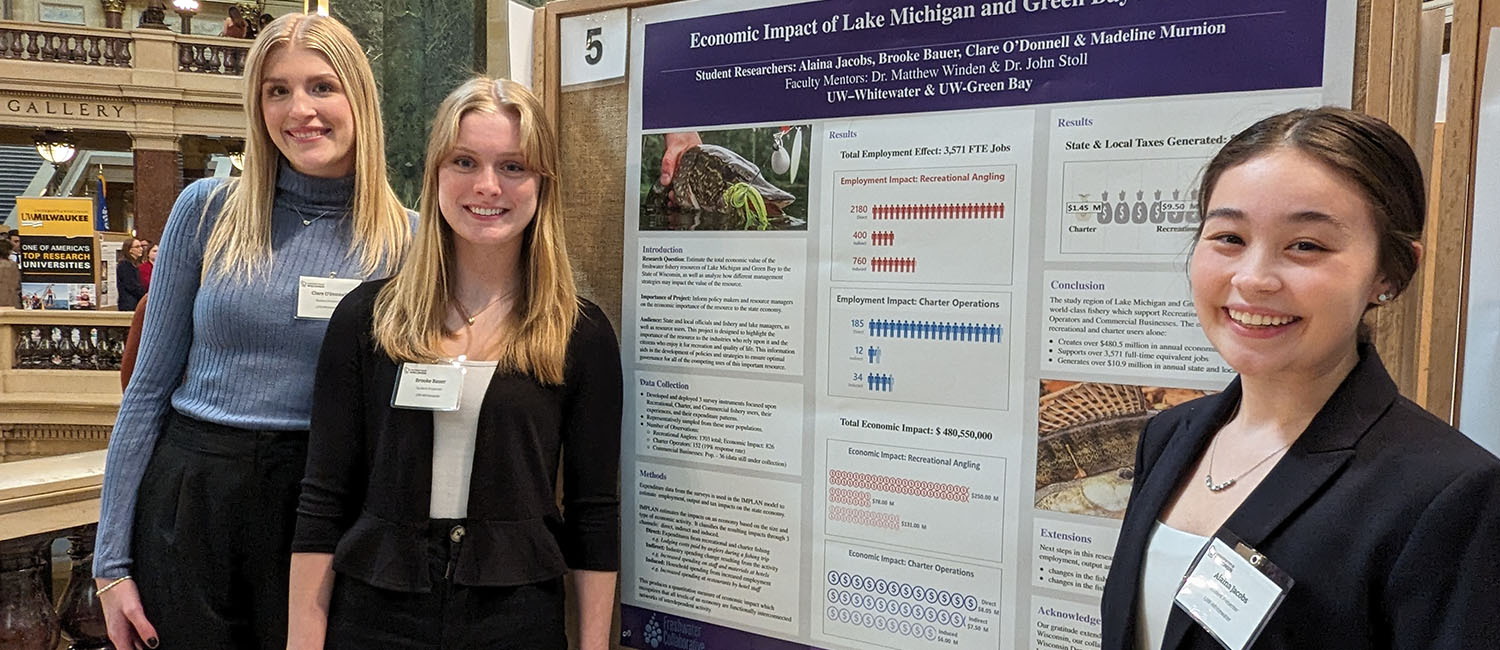The 2024 Research in the Rotunda featured 16 Freshwater Collaborative-funded research projects. Students shared more about their experience analyzing how different fishery management strategies and climate change scenarios may affect the quality, and therefore economic value, of Lake Michigan and the Bay of Green Bay. Changes in quality and economic value in turn affect the health of regional economies and welfare of residents and visitors. Ultimately, this information helps inform resource managers about the most efficient and effective strategies available to maximize the value of this resource now and in the future.
University: UW-Whitewater
Mentor: Matthew Winden
Students:
Alaina Jacobs
Major: Entrepreneurship
Expected graduation date: May 2026
Clare O’Donnell
Major: Environmental Science
Expected graduation date: May 2024
Summarize the research and your role.
Jacobs: This research consisted of estimating the economic value of Lake Michigan and the Bay of Green Bay. We conducted multiple surveys for anglers to gain more information on their expenditures.
O’Donnell: I was involved in writing sections of the literature review and referencing other surveys sent out about commercial/ recreational/ charter boat fisheries. I then created the section of the survey that collects data about commercial fisheries (this is ongoing) and helped review the survey in its entirety. I also helped customize and create the poster that we presented at Research in the Rotunda.
What skills did you learn?
Jacobs: I learned how to use Qualtrics and how to create a literature review on Excel.
O’Donnell: I learned how to reference past studies to aid in future research practices. I also learned how to properly write a literature review. I learned how to create surveys in a way that optimizes results while still being easy to navigate for respondents.
What has been your favorite part about this experience?
Jacobs: My favorite part of this experience has been working with the team. Our varying backgrounds and perspectives propelled our research process.
O’Donnell: My favorite part of this experience has been collecting the data and learning how important having the numbers can be when it comes to future decision-making. I also enjoyed referencing similar studies and seeing what we did differently and how we can improve.
What are some of the opportunities you’ve had because of this research?
Jacobs: I have had the opportunity to connect with local legislators and professors. This research has put me into important spaces. I had the opportunity to work alongside my peers, who also have a passion for the intersection of science and economics.
O’Donnell: This research has given me more relevant experience for the jobs I am interested in pursuing. It has allowed me to gain more experience in collaborative working and experience in how to properly conduct research.
What kind of career do you hope to go into after graduation?
Jacobs: I want to go into environmental entrepreneurship.
O’Donnell: I hope to work in something related to environmental policy, environmental social governance, environmental health and safety or environmental consulting.
How will this experience help you attain your career goals?
Jacobs: This experience has enhanced my ability to convey information effectively. I learned how to use Qualtrics and how to create a literature review in Excel. This high-impact practice strengthened my critical thinking skills, and that is a quality I will need as a business owner.
O’Donnell: This experience helped me gain relevant experience that can be applicable to many of the jobs I am interested in. I have learned so much through this process, and I am ready to use all the skills I have learned in the workforce.

